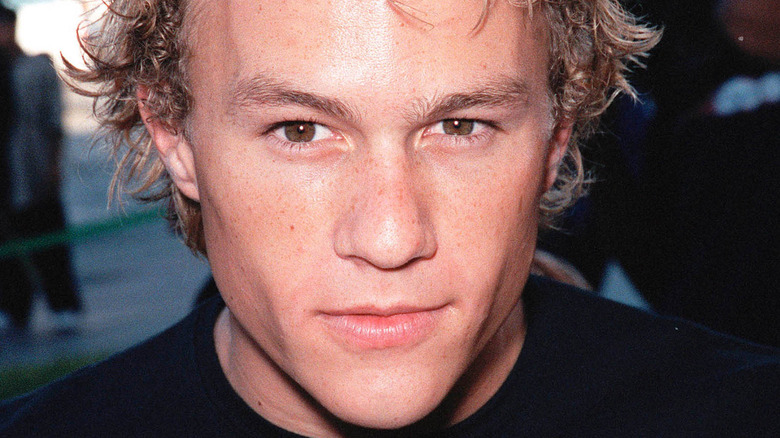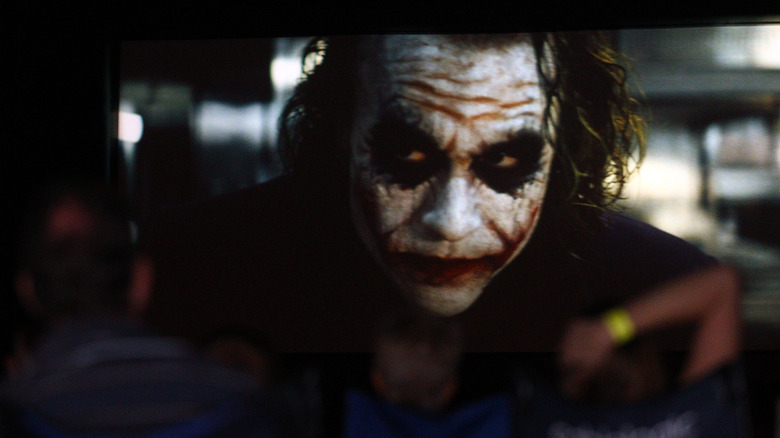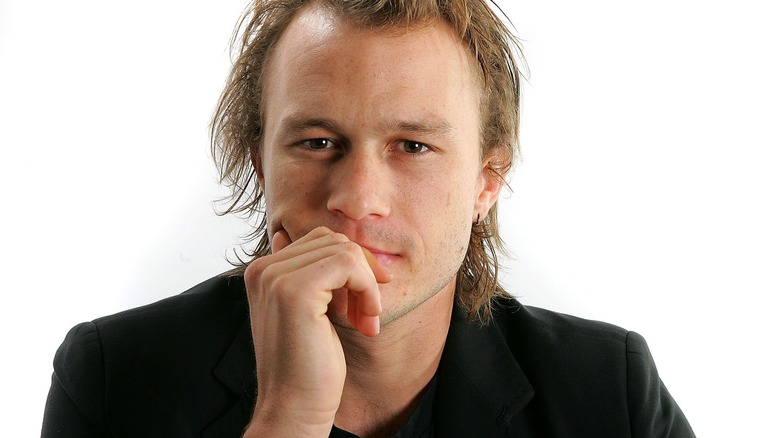The One Misconception People Have About Heath Ledger's Death
It's tough to watch "10 Things I Hate About You" or "A Knight's Tale" without feeling sad about the death of the leading star of those films, Heath Ledger. Ledger was a striking Australian actor, and he was known for his charismatic presence on screen. During his nearly 16 years in the industry, the Perth native entranced audiences as an angsty heartthrob, a conflicted cowboy, and a psychotic clown in one of his final roles. Despite his tragic death, his memory lives on in those roles.
Ledger's death, however, has had a lot of rumors and urban legends surrounding it. The actor died suddenly in 2008 in the apartment he was renting in Manhattan, according to The New York Times. There were no illegal substances found at the scene, only prescription medications. At the time, it was unclear whether those prescriptions played any role in his untimely death. Diana Wolozin, a masseuse, found Ledger unresponsive in his home, and instead of calling 911, she called Mary Kate Olsen several times before contacting the paramedics. This resulted in Olsen's bodyguards arriving at the apartment before authorities. This detail, along with Ledger's life at the time, caused rumors to swirl.
However, one particular claim regarding one of his final roles was eventually debunked by his sister.
Heath Ledger's sister insists that his death had nothing to do with playing the Joker
Before he died, Heath Ledger had just finished playing the role of the Joker in 2008's "The Dark Knight." The character isn't known as the Clown Prince of Crime for nothing — he's one of the most sadistic villains in pop culture. And getting into that headspace was not a walk in the park. Even Jack Nicholson, who played the Joker in 1989, said he "warned" Ledger about the mental toll of playing the villain on screen (via The Telegraph). The Independent reported in 2015 that Ledger locked himself in a hotel room for a month to "get in the mindset of the warped character." He allegedly even kept a dark "Joker journal" with ominous passages.
Despite the theories relating to his time as the Joker, those closest to him insisted that Ledger's death wasn't a result of his work on "The Dark Knight." His sister, Kate Ledger, discussed the matter in 2017 at the Tribeca Film Festival premiere of "I Am Heath Ledger." Kate said, "I was really shocked because that was him having fun,"(via The Telegraph). "Every report was coming out that he was depressed and that [the role] was taking this toll on him ... honestly, it was the absolute opposite," she said. Kate added, "It couldn't be more wrong. He had an amazing sense of humor, and I guess maybe only his family and friends knew that, but he was having fun. He wasn't depressed about the Joker!"
Heath Ledger reportedly had mental health issues and physical struggles leading up to his death
Heath Ledger reportedly had a tough time leading up to his death, and according to his sister Kate Ledger, the Joker had nothing to do with it. Heath told The New York Times in 2007 that he'd "probably slept an average of two hours a night" due to overthinking. Despite having issues in the past, the "Brokeback Mountain" star was sober by the time he died (via New York Magazine). Unfortunately, the actor died of an accidental overdose of prescribed medications, according to CNN. This included painkillers, anti-anxiety pills, and sleeping medications.
Another common belief about Heath's death was that he was depressed due to his recent split with Michelle Williams, with whom he shares a daughter, Matilda. However, Terry Gillam, a friend of Heath's and the director of the film the actor was making before he died, refuted that Heath's death was a result of depression due to his relationship. "He was upset by the turmoil in his private life. He wanted to do the right thing by Michelle," he told The Daily Mail in 2009. "He was obsessed with his love for Matilda and he was terrified he might lose access to her." The 28-year-old had insomnia but threw himself into his beloved work. Gillam believes the actor accidentally overdid it with pills he had for the condition. "He'd had problems in the past with drink and drugs, but he was clean by the time I knew him."
If you or someone you know needs help with mental health, please contact the Crisis Text Line by texting HOME to 741741, call the National Alliance on Mental Illness helpline at 1-800-950-NAMI (6264), or visit the National Institute of Mental Health website.



